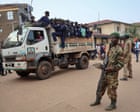
In a world often punctuated by turmoil and uncertainty, there have recently emerged glimmers of progress and reconciliation on the global stage, softening the backdrop of international issues. These developments encompass diplomatic endeavours, strategic alliances, and humanitarian hopes, bringing a more hopeful light to complex global scenarios.
One particularly significant development involves Rwanda and the Democratic Republic of the Congo, who have come together to sign a peace agreement in Washington, under the auspices of former US President Donald Trump’s administration. The agreement is aimed at halting prolonged clashes in the eastern DRC, rooted deeply in the aftermath of Rwanda’s 1994 genocide. This accord not only seeks to bring about immediate cessation of hostilities but also injects other vital principles such as the respect for territorial integrity within the region, in response to activities by armed groups.
Present at the signing was US Secretary of State Marco Rubio, alongside the foreign ministers of Rwanda and the DRC. The ceremony marked not only a pledge for the withdrawal of Rwandan troops from eastern Congo within 90 days but also underscored Trump’s claim of concurrent US-acquired mineral rights, a point of mutual benefit and strategic significance.
In another narrative of hope, British political and civil advocacy has wrought cautious optimism concerning the potential release of the renowned British-Egyptian activist, Alaa Abd el-Fattah. His family has expressed a sense of guarded hope following recent developments. Leader of the UK opposition Keir Starmer engaged Egypt’s President Abdel Fatah al-Sisi in discussions that mingled political diplomacy with human rights advocacy, further framed by ambitions to enhance UK-Egypt trade relations. Abd el-Fattah’s hunger-striking mother, Laila Soueif, paused her protest in anticipation of potential breakthroughs, reflecting diplomacy’s potential to kindle change.
Simultaneously, Trump has indicated a belief in the possibility of an imminent ceasefire in Gaza, adding a layer of optimism amidst complex geopolitical tensions. The US has been actively involved in seeking resolution through concerted diplomatic communications with regional players, hoping to orchestrate a cessation of hostilities and restore stability in the region.
While not without its critiques and complexities, these developments collectively suggest a quiet movement towards dialogue and de-escalation, reflecting broader diplomatic endeavors and the intricate weave of international relations. As all parties strive towards peaceful solutions, these narratives contribute to the idea of a more harmonious international community.
The evolving geopolitical landscape continues to demand mindful and concerted efforts, as witnessed in new partnerships, strategic dialogues, and humanitarian outreach that ripple through these latest developments. Through collaboration and persistent negotiation, the international community holds the potential to navigate challenging terrains and foster lasting peace.
Source: {link}
